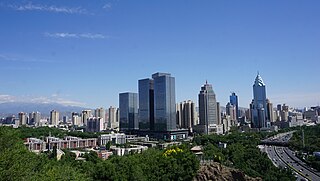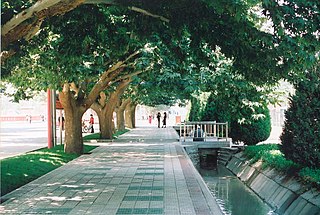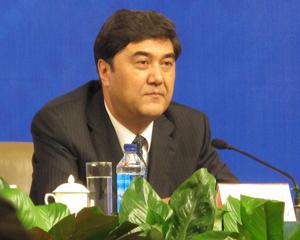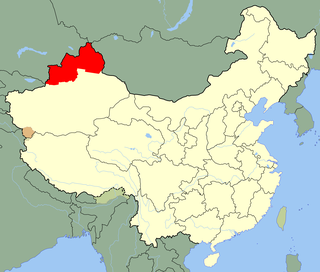Related Research Articles

Ürümqi is the capital of the Xinjiang Uyghur Autonomous Region in Northwestern China. With a census population of 4 million in 2020, Ürümqi is the second-largest city in China's northwestern interior after Xi'an, as well as the largest in Central Asia in terms of population. Ürümqi has seen significant economic development since the 1990s and currently serves as a regional transport node and a cultural, political and commercial center.

Yarkant County, also Shache County, also transliterated from Uyghur as Yakan County, is a county in the Xinjiang Uyghur Autonomous Region, China, located on the southern rim of the Taklamakan Desert in the Tarim Basin. It is one of 11 counties administered under Kashgar Prefecture. The county, usually referred to as Yarkand in English, was the seat of an ancient Buddhist kingdom on the southern branch of the Silk Road and the Yarkand Khanate. The county sits at an altitude of 1,189 metres (3,901 ft) and as of 2003 had a population of 373,492.

Kashgar Prefecture, also known as Kashi Prefecture, is located in southwestern Xinjiang, China, located in the Tarim Basin region. It has an area of 112,057 km2 (43,265 sq mi) and 4,496,377 inhabitants at the 2020 census with a population density of 35.5 inhabitants/km2. The capital of the prefecture is the city of Kashgar which has a population 506,640.

Poskam County, also Zepu County is a county in Kashgar Prefecture, Xinjiang Uyghur Autonomous Region, China. The county is located on the southern bank of the Yarkand River, also known as the Zarafshān River (泽勒普善河). Poskam County is bordered to the north and west across the Yarkand River by Yarkant County (Shache) and to the south and east by Kargilik County (Yecheng).

Maralbexi County, Bachu County, and Chinese: 巴尔楚克县) the former long Chinese name as well, is located in the southwest of the Xinjiang Uyghur Autonomous Region, China. The county is under the administration of the Kashgar Prefecture. It has an area of 18,491 km2 (7,139 sq mi), and surrounds, but does not administer, the sub-prefecture-level city of Tumxuk. According to the 2002 census, it has a population of 380,000.

Akto County is a county in Kizilsu Kyrgyz Autonomous Prefecture, Xinjiang Uygur Autonomous Region, China. The county borders Tajikistan and Kyrgyzstan and has two towns, 11 townships, four state-owned farms and a plant nursery under its jurisdiction. The county seat is Akto Town. The county has an area of 24,555 km2 (9,481 sq mi). In 2015 its population was 221,526; in 2017 it was 231,756.

On February 25, 1997, 3 bombs exploded on 3 buses in Ürümqi, Xinjiang, China. 9 people were killed, including at least 3 children, and a further 28 were injured. Another 2 devices in the south railway station failed to explode. Steel balls, screws, and nails were found in the bombs.

The East Turkestan National Army was the armed forces of the Second East Turkestan Republic (ETR). It was active from 1945 to 1949, beyond the dissolution of the ETR in 1946, when it was renamed the Ili National Army per a peace agreement between the ETR leadership and representatives of the Republic of China. It originally consisted of six regiments: the Suidun Infantry Regiment, the Ghulja Regiment, the Kensai Regiment, the Ghulja Reserve Regiment, the Kazakh Cavalry Regiment, the Dungan Regiment, the Artillery Subdivision, the Sibo Subdivision, and the Mongol Subdivision. The last two subdivisions were later reformed to regiments. All regiments were armed with mostly German-made weapons that were provided by the Soviet Union on orders by Joseph Stalin. Its personnel was trained in the Soviet Union. Rebel aviation included 42 airplanes, which were captured in the Ghulja Kuomintang air base and repaired by Soviet military personnel.

Nur Bekri is a Chinese former politician of Uyghur ethnicity, best known for his term as Chairman of the Xinjiang Uyghur Autonomous Region between 2008 and 2014. Between 2014 and 2018, he was vice-chairman of the National Development and Reform Commission and Director of the National Energy Administration, with rank equivalent of a minister. Bekri was one of the highest ranked ethnic minority officials in the Chinese government.
The Ghulja, Gulja, or Yining incident was the culmination of the Ghulja protests of 1997, a series of demonstrations in the city of Yining—known as Ghulja in Uyghur—in the Xinjiang autonomous region of China.
A series of violent riots over several days broke out on 5 July 2009 in Ürümqi, the capital city of the Xinjiang Uyghur Autonomous Region, in northwestern China. The first day's rioting, which involved at least 1,000 Uyghurs, began as a protest, but escalated into violent attacks that mainly targeted Han people. According to Chinese state media, a total of 197 people died, most of whom were Han people or non-Muslim minorities, with 1,721 others injured and many vehicles and buildings destroyed. Many Uyghurs disappeared during wide-scale police sweeps in the days following the riots; Human Rights Watch (HRW) documented 43 cases and said figures for real disappearances were likely to be much higher.
The Shaoguan incident was a civil disturbance which took place overnight on 25–26 June 2009 in Guangdong, China. A violent dispute erupted between migrant Uyghurs and Han Chinese workers at a toy factory in Shaoguan as a result of false allegations of the sexual assault of a Han Chinese woman. Groups of Han Chinese set upon Uyghur co-workers, leading to at least two Uyghurs being violently killed by angry Han Chinese men, and some 118 people injured, most of them Uyghurs.

The Ili Rebellion was a separatist uprising by the Turkic peoples of northern Xinjiang against the Kuomintang government of the Republic of China, from 1944 to 1946. The Ili Rebellion began with the East Turkestan National Revolution, known in Chinese historiography as the Three Districts Revolution, which saw the establishment of the Second East Turkestan Republic. The leadership was dominated by Uyghurs but the population consisted mostly of Kazakhs.

The 2010 Aksu bombing was a bombing in Aksu, Xinjiang, People's Republic of China that resulted in at least seven deaths and fourteen injuries when a Uyghur man detonated explosives in a crowd of police and paramilitary guards at about 10:30 on 19 August, using a three-wheeled vehicle. The assailant targeted police officers in the area, and most of the victims were also Uyghurs. Xinhua news agency reported that six people were involved in the attack, and two had died; the other four were detained by police.
Seriqbuya or Serikbuya is a town in Maralbexi (Bachu) County, Kashgar Prefecture, Xinjiang, China. It is located on Provincial Road 215, on the left (northwestern) bank of the Yarkand River and about 180 kilometers to the east of the city of Kashgar.
Shache Ye'erqiang Airport is an airport that serves Yarkant County (Shache) in Kashgar Prefecture of Xinjiang Uyghur Autonomous Region in northwestern China. It is located near Zerepshat/Zirefuxiati Village. The airport received approval from the State Council of China and the Central Military Commission in January 2014. The estimated cost of construction was 541 million yuan. Shache Airport opened on 1 August 2017 as the 19th airport in Xinjiang.
On the early morning of Wednesday, 30 July 2014, Juma Tahir, the imam of China's largest mosque, the Id Kah Mosque in northwestern Kashgar, was stabbed to death by three young male Uyghur extremists. Religious leaders across denominations condemned the attack.
The COVID-19 epidemic in Xinjiang Uyghur Autonomous Region is part of the worldwide pandemic of coronavirus disease 2019 (COVID-19) caused by severe acute respiratory syndrome coronavirus 2 (SARS-CoV-2). On 23 January 2020, the local government confirmed the first two case in Urumchi, the capital city of Xinjiang.
Hamudun Niyaz is a Chinese politician of Uyghur origin who served as chairman of the Standing Committee of the People's Congress of Xinjiang Uygur Autonomous Region between 1985 and 2003. Prior to that, he served two separate terms as mayor of Ürümqi, from 1966 to 1967 and from 1973 to 1978.
The 2014 Yarkant attacks occurred in Yarkant County in Xinjiang on 28 July. Authorities stated that an armed gang of masked militants carried out attacks against civilians as well as local police across towns in the county.
References
- 1 2 "一名维吾尔人因提到新疆屠杀被逮捕" [Uyghur arrested for mentioning massacre in Xinjiang]. Radio France Internationale (in Chinese). 11 August 2014. Archived from the original on 12 February 2023. Retrieved 28 September 2020.
- ↑ "新疆莎车暴恐案致37名民众遇害 59名暴徒被击毙" [37 people killed, 59 thugs shot dead] (in Chinese). Sina新聞中心. Tianshannet. 3 August 2014. Archived from the original on 27 May 2021. Retrieved 28 September 2020.
- 1 2 3 4 5 6 "法新社:2014年莎车暴力事件死伤人数或远超官方数据" [Agence France-Presse: Death toll in Yarkand violence in 2014 may far exceed official figures] (in Chinese). Deutsche Welle. 法新社. 29 April 2015. Archived from the original on 28 September 2020. Retrieved 28 September 2020.
- 1 2 3 Demick, Barbara (8 August 2014). "Deadly clash in China: An ambush by Uighurs or a government massacre?". Los Angeles Times . Retrieved 15 September 2022.
- 1 2 "East Turkestan: Anniversary of Yarkand Massacre Marked by Uyghur Community amid Chinese Silence". UNPO. 29 July 2016. Archived from the original on 18 August 2021. Retrieved 28 September 2020.
- ↑ "PRESS RELEASE: WUC MOURNS THE VICTIMS OF THE YARKAND MASSACRE ON THE 6TH ANNIVERSARY". World Uyghur Congress. 28 July 2020. Archived from the original on 13 September 2020. Retrieved 28 September 2020.
- 1 2 "'At Least 2,000 Uyghurs Killed' in Yarkand Violence: Exile Leader". Radio Free Asia . Archived from the original on 18 November 2020. Retrieved 15 September 2022.
- 1 2 "【37人被捕】新疆莎車縣縣委常委、公安局長涉賄" [[37 arrests] Member of the Standing Committee of the County Party Committee and Chief of Public Security of Shache County, Xinjiang, involved in bribery]. Apple Daily . 25 January 2018. Archived from the original on 21 June 2021.
- ↑ Smith Finley, Joanne (3 July 2021). "Why Scholars and Activists Increasingly Fear a Uyghur Genocide in Xinjiang". Journal of Genocide Research . 23 (3): 348–370. doi:10.1080/14623528.2020.1848109. ISSN 1462-3528. S2CID 228884439.
during what exiles have called the Yarkand Massacre of 2014, in which between 1000 and 3000 Uyghurs were allegedly killed by security forces
- ↑ "China Now Says Almost 100 Were Killed in Xinjiang Violence". Time . Archived from the original on 1 September 2022. Retrieved 15 September 2022.
- ↑ "Rare Visit To Town At Centre Of Massacre Claims". Sky News . Archived from the original on 15 September 2022. Retrieved 15 September 2022.